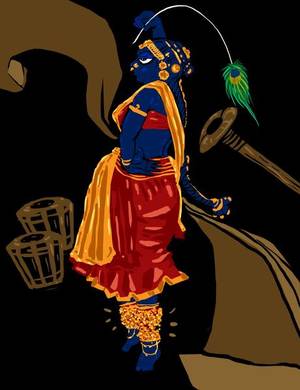
Muddupalani was a skilled courtesan (devadasi) in the court of Pratapasimha, a Maratha ruler who was a celebrated patron of arts. Under his tutelage, Muddupalani’s many talents as a dancer and poet flourished and not only did she create “Radhika Santawanam”, an epic balled of 584 poems, but also others – such as her experiments with saptapadalu or seven-lined songs; her translation of Andal’s “Thiruppavai”; and “Ashtapad”, a Telugu translation of Sanskrit poet Jayadeva’s eponymous work.
Not much is known about Muddupalani’s personal life expect that she came from a family of respected devadasis. Her grandmother Tanjanayaki was a gifted musician and well-known in the Thanjavur circles while her mother Rama Vadhuti was another talented courtesan. Muddupalani was named after the god Palani and her surname Muddu was placed in front of her name, which was a common practice in the South at that time.
A self-aware writer, Muddupalani often spoke highly of herself at the beginning of her work, talking about her illustrious lineage and her life. Her works were celebrated during her time and became a part of classical Telugu literature.
Another devadasi, Nagarathamma, 200 years later, found Muddupalani as a reference in literature on Thanjavur. It took a while for her to find an original copy of “Radhika Santawanam” and she prepared a new version published by a small press. It was banned by the British colonial authorities in 1911, and the ban was rescinded in 1947.
Muddupalani introduces herself in a rich fashion in “Radhika Santawanam”, offering glimpses into her life that is otherwise unknown.
Which other woman of my kind has
Felicitated scholars with gifts and money?
To which other woman of my kind have
Epics been dedicated?
Which other woman of my kind has
Won such acclaim in each of the arts?
You are incomparable,
Muddupalani, among your kind
A face that glows like the full moon,
Skills of conservation, matching the countenance.
Eyes filled with compassion,
Matching the speech.
A great spirit of generosity,
Matching the glance.
These are the ornaments
That adorn Palani,
When she is praised by kings.
During the Thanjavur Maratha reign, courtesans such as Muddupalani had access to learning, writing and the arts, unlike family women. They owned property, their work was held in high esteem and they enjoyed equality with men.
Picture Credit : Google






